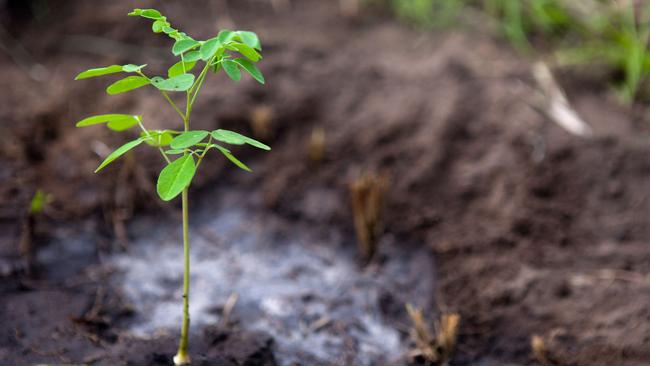UK’s Atom Bank steals a march on carbon offsetting
Many firms have supported tree-planting projects as a way of burnishing green credentials, usually through third-party scheme developers. The UK’s Atom Bank is taking a direct approach.

The UK’s Atom Bank has been a bit of a pioneer. The challenger bank was one of the first deposit-takers to launch with no branches at all. It was also the first substantial UK employer to put its staff on a four-day week with no loss of pay. Now it has blazed a different trail: it’s bought itself a wood.
Ten hectares newly planted with oak, rowan, willow, birch, sycamore, field maple and hawthorn, to be exact. For now, the 35,000 trees are tiny, no more than saplings, their shoots just starting to emerge from the plastic guards that protect them from nibbling voles.
But in time, they should grow into a mature wood, one that Atom reckons will absorb 7000 tonnes of carbon, which is almost exactly how much it calculates it has emitted in its first 10 years as a business.
“We’ve been responsible for putting it into the atmosphere,” Atom co-founder Ed Twiddy says. “We should suck it out again.”
The plot cost £240,000 ($482,000) and the aim is to own it in perpetuity, he says.
It will take decades for the trees to grow sufficiently to absorb the carbon already emitted by Atom and its employees in commuting and that doesn’t include its “financed emissions”, the carbon attributed to banks because of their loans to polluting borrowers. But it is a great start.
There’s a pleasing circularity about its choice of site. The wood is above what used to be West Chevington open-cast coal mine, a few miles north of Morpeth in Northumberland and not so far from the Atom offices in Durham.
West Chevington was one of a handful of gigantic craters scraped out of the earth to feed Britain’s vast appetite for coal. The neighbouring Butterwell pit was said to be the biggest man-made hole in the ground in Europe. The pits, great engineering feats in their time but terrible lifeless moonscapes too, have been filled in and returned to farmland and, in this case, a small wood in embryo. The fauna, hares and deer are already returning.
The places that played a part in Britain’s then unwitting role in contributing to global warming decades ago are now in a small way part of the solution. Many companies have supported tree-planting projects as a way of trying to burnish their green credentials and claim carbon credits to offset their emissions; but almost always they use third-party scheme developers.
One big one is the Woodland Trust charity, which plants trees and manages woodland for companies including Aviva, Lloyds Bank, Pets At Home, St James’s Place, Card Factory and Taylor’s of Harrogate.
But Atom is rare in putting the wood on its own balance sheet and taking much more responsibility for it in-house. That approach hasn’t always been successful. BrewDog, the brewing company, tried it and more than half the 500,000 trees it planted near Aviemore in Scotland died after a prolonged dry spell.
BrewDog co-founder James Watt declared it “the purest, most altruistic thing we’ve ever done” but still got widely criticised. “If you’re looking purely through a reputational lens, we’d have been better if we’d taken that £20m (the cost of the project) and spent it on hookers and coke in Vegas,” he told The Sunday Times.
Owning a wood is a challenge and a responsibility. “You can’t just buy a piece of land, plant it and forget about it,” says Martin Taylor of the Woodland Trust.
The land has to be pre-registered with the Woodland carbon code, which polices the carbon credits system in the UK. Choice of species is key to maximise carbon absorption and natural diversity. So is the tending and nurturing and thinning of the wood in its first 20 years before it gets fully established.
Twiddy is confident Atom has done all the right things. A former Treasury official whose job included dealing with what was left of Northern Rock at the time of the banking crisis, he is a quietly persuasive proselytiser for companies to do more in slowing climate change.
He also has big ambitions to expand in woodland, aiming to buy another 100 hectares this financial year and 1000 by the end of the decade. Atom’s latest annual carbon report, published this month, is a model of honesty, clarity and realism compared with the muddle and obfuscation of too many companies.
Huge scepticism surrounds the claims of companies when it comes to their net-zero ambitions, even when it comes to tree planting. The biggest is that they are claiming credit for future carbon absorption they cannot guarantee. The trees have to grow unmolested for a century. An auditor allowing that kind of optimism in financial accounting would be struck off.
Greenwashing remains common, especially among banks. Only last week Lloyds was rebuked by the Advertising Standards Authority and had an advert that misled people about the extent of its environmental claims banned. HSBC was rapped in the same way two years ago.
But there is something about an actual physical wood that dispels the doubts while doing its normal job of housing warblers and worms and soothing the soul.
Britain has one of the lowest proportions of woodland in Europe at 13 per cent, while the government target to plant 30,000 hectares a year has proved horribly optimistic. It is running at about 10,000 a year.
Thousands of us will don wellies today to go on a traditional seasonal walk, often through ancient woodland.
It would be nice to think one or two business chiefs will be inspired to consider planting a wood as an alternative use of spare cash.
It sure beats another boring share buyback.



To join the conversation, please log in. Don't have an account? Register
Join the conversation, you are commenting as Logout